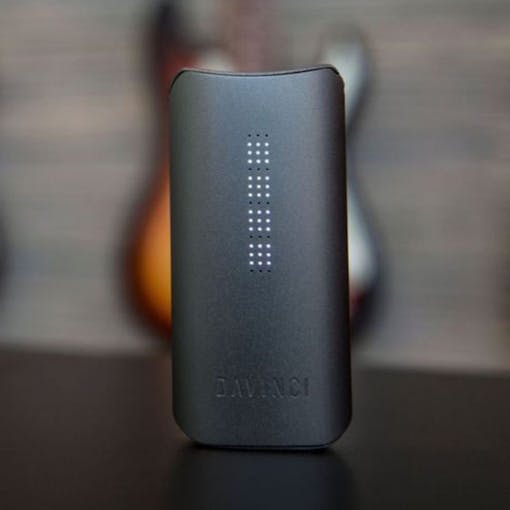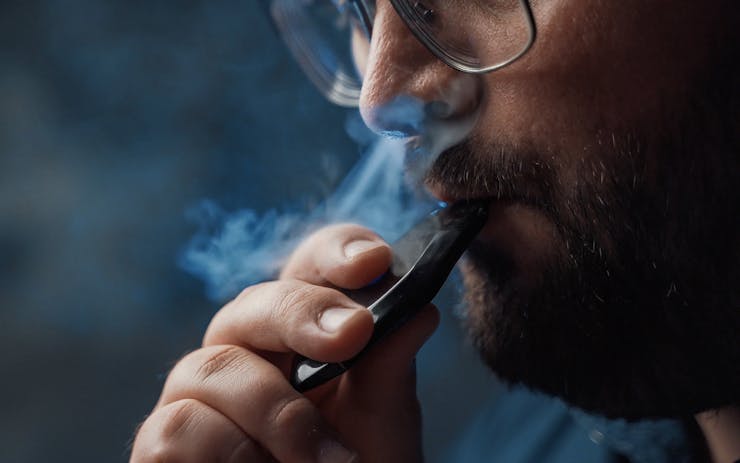People have been vaporizing cannabis since before Christ. In Histories, Greek writer Herodotus recounted the details of a ritual the ancient Scythians of Central Asia performed, who lived around 600 BCE – 400 CE: Hemp seeds and plants were put on red-hot stones and people engulfed themselves in the resulting vapor.
A few thousand years later, vaping has definitely become way more technical. Weed vaporizers continue to evolve today, and technology is making vaping more and more like smoking joints and taking dabs. But what is the future of vaporizers?
To gain insight, I reached out to multiple players in the vape category: Storz and Bickel, DaVinci Vaporizers, Airgraft, Vessel, and AirVape. After talking about where the vape market is going, one common answer became apparent: personalized experiences.
The history of vaporizers

In vaporization, a heating mechanism heats cannabis oil to activate cannabinoids and terpenes. Smoking weed, or combustion, uses a flame to do the same, but with burning flower comes the ingestion of harmful smoke and carcinogens. Vaping is seen as a healthier alternative to smoking, and here’s how inventors started to develop it in the past century.
There’s controversy out there about who should be credited as the originator of modern-day herb vaporization, but research suggests the first ever e-cig was created in 1927 by Joseph Robinson.
After that, the first “smokeless non-tobacco cigarette,” was created by Herbert Gilbert in 1963. And the first portable herb vaporizer, called the “Shake and Vape,” was created in 1993 by Eagle Bill Amato. Shortly after that, Storz and Bickel came out with the famous tabletop Volcano vaporizer in 2000.
In 2003, Chinese researcher Hon Lik came up with modern e-cigarette technology that eventually birthed 510-threaded vape cartridge technology, and in 2007, Pax Labs—originally called Ploom—created a weed vaporizer that eventually led to the closed-loop system of proprietary cartridges, like the PAX Era for cannabis. The rest is still history in the making.
The future of vaporizers
In talking with several vape companies, I learned that the future of vaporizers will be in personalization. While none of the companies were willing to tell me what updated technologies they’ll be crushing the game with next (for obvious reasons), they were all able to tell me how they’ve improved their current products based on customer complaints and wants.
Shop highly rated dispensaries near you
Showing you dispensaries nearThat means dosage control, temperature control, colors, size, shape, discretion, and more. Dosage control allows consumers to know exactly how much THC or CBD they consume; temperature control allows for different temps for different strains; and options around color, size, and shape come down to simple aesthetics, and whether you want something that can hide in your palm or fit in your pocket.
Handheld dry herb vapes

Most people view oil carts and vapes as superior to flower vapes because they’re discreet, have a reduced smell, and because many allow for specific control over temperature, session, and dosage.
In the future, handheld dry herb vaporizers will aim to close this gap. For example, companies like AirVape have devices that let you pick a specific temperature; Roland Szegi, AirVape’s owner, suggests somewhere around 410-415°F. Also, they have invented the AirVape shell, a small carrying case of sorts that fits around the device to block any post-session aromas that make you smell like weed—it works flawlessly, too!
“The X Shell, and later on, the XS GO Shell, was created with the intent to keep the vaporizer completely smell proof, and it became a signature element of the product with its protective capabilities as well,” said Szegi.

DaVinci’s vaporizer, while not having a shell, has created a food-safe device where you can add certain food and flowers with terpenes to help mask smells. “Our IQ Series vaporizers are suited with the Zirconia Flavor Chamber which you can add your favorite herbs or fruit rinds to,” said Shannon Wachter, Brand Reputation Manager for DaVinci Vaporizers. “This will enhance the consumer’s overall terpene intake—we always say ‘make your vapor smell better.’”
Past that, DaVinci’s IQ series devices come with a smartphone app that lets you personalize your session down to the exact ratio of THC and CBD you’re taking in, a necessary tool for medical cannabis patients.
Desktop dry herb vaporizers

When it comes to vaporizing cannabis at the crib, Storz and Bickel’s Volcano has been the epitome of quality for decades. I asked them what complaints their customers have, and what upgrades they hope for in the future. Mostly, their customers complain about price.
“The Volcano still outperforms everything on the market in terms of pure vapor quality,” said Vatra Syla, Head of Marketing for the vape juggernaut. “People complain about the price, but it’s expensive because it’s quality built.”
In the future, the device will probably remain at the same price point considering how expensive it is to build, however the desktop devices may come with more color options. “Last year we celebrated the 20th anniversary of the Volcano [with a gold plated version], and we released the food grade one,” said Syla. “There’s potential for further additions to the Volcano.”
510 cartridge batteries
510-threaded vape cartridges are the most common form of vaporizing cannabis. The future of 510 batteries will cater to an increased emphasis on temperature and aesthetics.
Originally, 510 batteries only heated cannabis oil to one temperature. The thing is, each cannabis strain has its own temperature range that brings out the most of it. This means a battery needs to be able to adjust temperature.
That’s why advanced 510 battery systems like Vessel’s 510 batteries exist. Vessel’s batteries come with 4 different temperature settings to help activate the variety of cannabinoids and terpenes in cannabis oils.

Additionally, for those who aren’t so much into the long and slender aesthetic of traditional vape pens, 510 cartridge companies are dropping palm-size batteries—Vessel now has the Compass, for example.
“There’s a lot of attraction to having pen-style devices, but we knew there was a big, emerging audience that wanted small, compact, on-the-go,” said Vessel Founder and CEO, James Choe. “When you feel it in your hand, it feels like it was molded to your palm.”
Closed-loop vape systems

Closed-loop vape systems, aka proprietary pods, are systems in which a company’s battery only works with specific non-refillable cartridges from that same company. Examples of closed-loop systems are the PAX Era and the Airgraft 2.
These systems have some of the most advanced heating technology and allow the most customization in temperature and dosage, which leads to extremely flavorful and smooth vape sessions.
But the biggest issue with proprietary pod systems is the price of both the device and the pods. A half-gram of oil for a closed-loop system may cost the same price as a full-gram of the same oil in a 510 cartridge.
Airgraft is taking on this issue by rolling out their new subscription service, which allows for huge savings on full-gram carts. Factoring in expenses to cartridge makers and extractors, plus taxes, cartridges can get expensive.
“For every dollar that I charge, the consumer has to pay $4.50 on the other side,” said Mladen Barbaric, Airgraft Founder and CEO. “Members pay us $10 a month and they have access to unlimited pods. It results in a retail price that’s significantly lower on our platform than it is on other platforms.”
Access to high-quality products for reasonable prices is every cannabis consumer’s goal. Should Airgraft’s membership system prove superior to other purchasing options, it could very well become the new industry standard.





